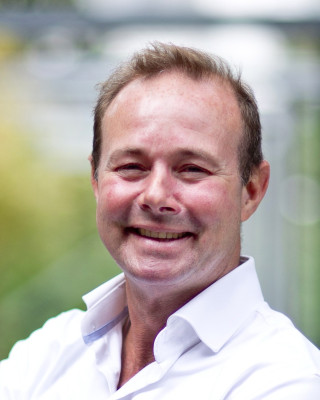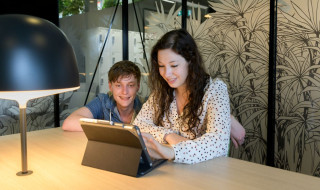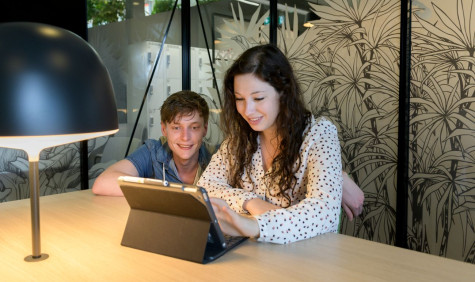The governance challenge of AI
It is a conundrum. To reap the benefits of an innovation like AI, you have to give space to initiatives. But also make choices at the right time. How do you do that? A conversation with Bart Combee, chair of the executive board of InHolland University of Applied Sciences, about AI, organisational development and the Think Tank Digital Transition.
"AI is an exploration trip. I compare it to the development of the internet in the early 2000s. Everybody knew that this technology was going to be very important, but nobody could predict exactly when and how. It's the same with AI: we know it will be very disruptive, but in what way exactly... we don't know.

Bart Combee
If you try to make projections from what you know now to the future in 15 years, I don't think the outcomes will make much sense. When the internet emerged, we could not foresee how fundamentally it would change society and businesses. For AI, I dare predict that the effects are also going to be fundamental.
Professions are changing because of AI, and that means the content of education has to change with it. But digital developments are also changing who learns and how we learn. And with that, education too will soon be designed in a very different way."
AI is not just an IT story, you have said, but an educational transition that starts with strategically naming that AI is important. Can you elaborate on that?
"At InHolland, we are strongly exploring how professions are changing through the application of AI. This is slightly different for each profession. In that quest, we need to connect with all the industries and employers who are also working on this. They have the understanding of what is possible from technology. That close connection with innovative companies that have a lot of understanding of AI applications is crucial in my view.
AI is also a transition of human resources: we still have to learn it all ourselves, the employees as well as myself. Imagine if it were possible to have AI do all kinds of tasks for teachers. Things they don't really like, like administrative tasks, reviewing tests, filling in assessment matrices. Then lecturers could spend more time on what they enjoy most, which is personally guiding students. This is how you make education better and teachers' work more fun. But of course that doesn't just happen: you have to organise the work differently.
"There, I developed a keen interest in digital developments and how disruptive they can be for business models."
Throughout my career, I have worked in organisations that had to reinvent themselves because the world in which they operated was changing. Major transitions in society also lead to major changes in sectors. I find that incredibly interesting.
For example, I was director of the Consumers' Association for a while. That is an organisation that also has a lot to do with digital development. There, I developed a great interest in digital developments and how disruptive they can be for business models."
What do you think is important to keep up in those transitions?
"As a board, our role is to facilitate our people so that they can learn from each other and from good examples. I want to connect people in our organisation to people outside InHolland. This involves a lot of experimentation; that is necessary. And yet we also need some coordination.
Think of it as a flower garden. You let a thousand flowers bloom; this means you give a lot of room for innovation. But at some point you have to converge. Because if you keep a thousand different flowers, then it becomes a darn difficult garden to maintain. How long do you diverge and let new things emerge, and when do you converge? That is one of the most difficult governance issues.

To learn from each other, it is necessary to connect people inside and outside the institution. Photo: InHolland University of Applied Sciences
Now we are in the divergent phase. Meanwhile, you already feel the need to converge in many places. If you do that too early, you let important innovations run their course. However, if you do it too late, it becomes ungovernable. We are in that playing field now."
How can we deal with that uncertainty?
"I join dynamic networks, such as the Think Tank Digital Transition, to meet as many people as possible who are working on this. But I don't limit myself to networks at board level: I also focus on all kinds of other levels and areas of expertise. You have to make that space to avoid the risk of groupthink . After all, new knowledge develops and spreads best when many people from different perspectives and disciplines meet to share best practices and sometimes failures, as well as new developments.
"Working together also means dividing tasks, giving each other mandate and trusting the other to carry it out properly. This saves time."
This is by no means always necessary in formal networks. Relevant connections can also be made informally. And sometimes you may form coalitions: because you want to do things together, to get further than if you were to take them on alone. If every educational institution starts inventing the wheel itself, that leads to social waste anyway."
What do you think is the added value of the Think Tank Digital Transition?
"What I like about this strategic conversation is that we jointly explore what the nature of the AI transition might be. And in what dimensions it might take place. So it's an investigative conversation, and I find that interesting. I then share the insights we gain back with people in my organisation and later at the SURF Summit in October with fellow administrators.
What I would like to give readers right now is that I think it would be good if we trusted each other more: working together also means dividing tasks, giving each other a mandate and trusting that the other will carry it out properly. That saves time. And there's a lot to be gained there."
Text: Maureen van Althuis
Photos: InHolland University of Applied Sciences
'The governance challenge of AI' is an article from SURF Magazine.
Back to SURF Magazine
Questions following this article? Mail to magazine@surf.nl.

